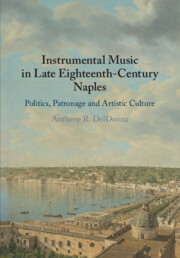Book contents
- Instrumental Music in Late Eighteenth-Century Naples
- Instrumental Music in Late Eighteenth-Century Naples
- Copyright page
- Dedication
- Contents
- Figures
- Tables
- Musical Examples
- Acknowledgments
- 1 Naples on the Grand Tour and within the Historical Imagination
- 2 The Neapolitan Conservatories
- 3 Pedagogical Training and Formation in the Conservatory Curriculum
- 4 Maria Carolina as Cultural Patron and Icon
- 5 Music for the Queen and the Court of Naples
- 6 Genre, Style, and Transnational Crosscurrents
- 7 Maestri e operisti
- 8 Maestri e operisti
- 9 Epilogue
- Bibliography
- Index
1 - Naples on the Grand Tour and within the Historical Imagination
Published online by Cambridge University Press: 04 December 2020
- Instrumental Music in Late Eighteenth-Century Naples
- Instrumental Music in Late Eighteenth-Century Naples
- Copyright page
- Dedication
- Contents
- Figures
- Tables
- Musical Examples
- Acknowledgments
- 1 Naples on the Grand Tour and within the Historical Imagination
- 2 The Neapolitan Conservatories
- 3 Pedagogical Training and Formation in the Conservatory Curriculum
- 4 Maria Carolina as Cultural Patron and Icon
- 5 Music for the Queen and the Court of Naples
- 6 Genre, Style, and Transnational Crosscurrents
- 7 Maestri e operisti
- 8 Maestri e operisti
- 9 Epilogue
- Bibliography
- Index
Summary
The establishment of Naples as an independent kingdom in the eighteenth century not only drew the European diplomatic corps to the city but also initiated a broad civic renewal and beautification of the city. Although Naples had been a cultural and musical capital of Europe since the previous century, the coalescence of political stability and social renewal with the intertwined network of artistic institutions (conservatories, theaters, churches, and patrons) propelled the kingdom into continental prominence. The city became a destination point for the vast number of travelers moving across the continent in search of pleasure, leisure or of “knowledge” (particularly regarding the reclamation of antiquity), or simply to follow prevailing fashions. These travelers – often young, affluent, educated, and with ties to aristocratic birthright – headed south for the “Grand Tour.” As a “must see,” Naples became an obligatory stop, and the experiences of travelers were immortalized in numerous books, journals, periodicals, travelogues, memoirs, visual arts, etc. Their reflections often merged around the broad themes of natural phenomena, the patrimony of ancient civilizations, and the unprecedented diversity of entertainment (above all, opera). Through these wide-ranging sources, this chapter documents how Naples entered the public imagination as a broad ideal of culture.
Keywords
- Type
- Chapter
- Information
- Instrumental Music in Late Eighteenth-Century NaplesPolitics, Patronage and Artistic Culture, pp. 1 - 26Publisher: Cambridge University PressPrint publication year: 2020

